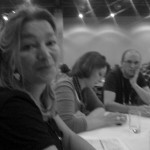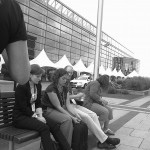
…and speeding down the hill came Ramone with his sparkling new ice cream van and a bullet for Molly Macs for breaking his heart.
[this is a post which was written in the summer… I have moved house now, thanks, and it’s lovely.]
So what is the connection between unexpectedly finding Haytor, and Realist Approaches? Well, recent months have found me boring on to anyone that was unfortunate enough to be in the vicinity about house hunting. And the thing about house hunting is that there are always more houses to hunt. So, this picture was taken last Friday evening, as I’d just been to visit a garden flat in Ilsington, and took a left and not a right turn upon leaving, and so instead of finding myself in Sigford, I happened upon Haytor. Which was nice.
Sorry, yes, still haven’t got to the connection. Okay, so finding a new home – there’s always more of them out there, and the thing is, you’re always going to wonder if the one that you’ve found is the right one/best one so you can stop looking… and you’ll also find interesting and pretty things along the way (like unexpected Dartmoor) which can be distracting or crucially important….. but the search for houses really tends to be governed by external factors: how much time have you got? how much money have you got? etc etc.
….. which is a bit like realist synthesis…. it might be the objective of the realist synthesis to achieve theoretical saturation, so that we can be pretty confident that there is ‘no more’ important evidence to capture for the particular theory we are building or testing…. but the truth is, a more practical approach tends to be necessary – there will always be further evidence that would be brought to bear, to further build or refine our thinking…. so when we ‘stop’ searching, are we making a judgement which is based more on external factors to the project (time, funding), rather than the internal factors (we’ve found it all)? When does synthesis stop?
My colleagues at UEMS who have far more experience than me in research, are going to be invaluable in helping judge when the time has come to down tools, bearing in mind there will always be more explanations, and always more houses.






